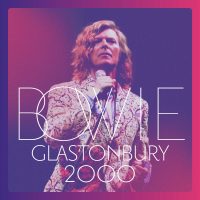David Bowie closed the 2000 Glastonbury Festival with a triumphant performance on the Sunday night.
The show was 29 years after his first appearance at the festival, aged 24, on 23 June 1971.
He’s one of the three greatest of all-time: Frank Sinatra, Elvis Presley and David Bowie.
Glastonbury Festival founder
Bowie played a mix of old and new songs, ranging from Hunky Dory-era classics to Earthling hits – although nothing from his most recent album ‘hours…’
The band:
- David Bowie: vocals, acoustic guitar, harmonica
- Earl Slick: electric guitar
- Mark Plati: electric guitar, acoustic guitar, bass guitar, vocals
- Gail Ann Dorsey: bass guitar, electric guitar, clarinet, vocals
- Mike Garson: piano, keyboards
- Sterling Campbell: drums, percussion
- Holly Palmer: percussion, vocals
- Emm Gryner: keyboard, clarinet, vocals
I often get asked what the best set I’ve seen here at Glastonbury is, and Bowie’s 2000 performance is always one which I think of first. It was spellbinding; he had an absolutely enormous crowd transfixed. I think Bowie had a very deep relationship with Worthy Farm and he told some wonderful stories about his first time at the Festival in 1971, when he stayed at the farmhouse and performed at 6am as the sun was rising. And he just played the perfect headline set. It really was a very special and emotional show.
Glastonbury Festival
Bowie’s Glastonbury appearance was one of two dates in his Mini Tour of 2000, the others being a festival warm-up show in London on 22 June, a concert at the BBC Radio Theatre in London’s Broadcasting House on 27 June, and shows at New York’s Roseland Ballroom on 16 and 19 June.
The Mini Tour followed the Hours Tour, although Bowie performed few songs from the ‘hours…’ album. He chose instead to play songs from throughout his back catalogue, drawing on crowd-pleasers rather than lesser-known newer songs.
Bowie headlined the Glastonbury Festival on the Sunday night, traditionally a slot for legacy acts. Highlights from the set were shown by the BBC, but the corporation lacked the rights to broadcast the full set.
At just after 10pm, Bowie appeared on a backstage camera, looking nervous but determined. Moments later, he was on stage, sporting a three-quarter-length Alexander McQueen frock coat, wonderfully wide Oxford bags and long hair swept to the side a la Veronica Lake. Where had I seen this outfit before? It struck me there and then, that Bowie was referencing his own performance at this very same spot almost 30 years earlier, and that he looked just as groundbreakingly beautiful and “gay” now as he did back then. For all his reputation as one of rock’s great shape-shifters, Bowie had decided to headline Glastonbury as … himself! He launched into Station To Station’s ‘Wild Is The Wind’, then ‘China Girl’, and already the nerves were gone and he was visibly beginning to enjoy himself. He followed it with ‘Changes’, a song he’d debuted at that 1971 Worthy Farm appearance as the sun was rising. We were only three songs in and the crowd were already eating out of Bowie’s hand.Bowie had not been one for playing greatest-hits sets, but that night it was clear he’d come to reclaim his legend. And as [Bowie’s publicist Alan] Edwards and I began watching the set in director Janet Fraser-Crook’s scanner, it was obvious we were heading for a broadcasting disaster if we cut it short.
I persuaded Edwards to accompany me to the edge of the Pyramid stage, where he would try and get a word to David via Coco Schwab, his legendary assistant. The set was so clearly going to be a resounding triumph, that surely – surely – this had to be shared with the watching nation? We stood there watching ‘Changes’ and some of the fourth song, ‘Stay’, but there was only a shake of the head from Coco and no sidelong glance from the stage, where Bowie and band were riding high. At least these shenanigans bought our broadcast one more song; assistant producer Alison Howe was charged with staying with the set until I returned to the BBC Two scanner, and so we shared a fifth song – which just happened to be ‘Life On Mars?’
I rushed back into the BBC Two scanner moments before the end of ‘Life On Mars?’ and had to explain to the presenter, Jamie Theakston, that we were coming off Bowie. I should have asked him to explain to the nation that it had been insisted upon by the artist himself. But naively I didn’t want to blame Bowie: it was the early days of our coverage and I hadn’t yet reasoned that the audience’s expectation of a Glastonbury headliner no longer sat with the artist but with the BBC…
As we were providing images for the huge stage screens, we rolled the tapes so that at least the footage of the show would exist.
The Guardian, 25 October 2018
 Bowie’s full set was released on CD, DVD and vinyl as Glastonbury 2000 on 30 November 2018.
Bowie’s full set was released on CD, DVD and vinyl as Glastonbury 2000 on 30 November 2018.
The setlist:
- ‘Introduction (Greensleeves)’
- ‘Wild Is The Wind’
- ‘China Girl’
- ‘Changes’
- ‘Stay’
- ‘Life On Mars?’
- ‘Absolute Beginners’
- ‘Ashes To Ashes’
- ‘Rebel Rebel’
- ‘Little Wonder’
- ‘Golden Years’
- ‘Fame’
- ‘All The Young Dudes’
- ‘The Man Who Sold The World’
- ‘Station To Station’
- ‘Starman’
- ‘Hallo Spaceboy’
- ‘Under Pressure’
- ‘Ziggy Stardust’
- “Heroes”
- ‘Let’s Dance’
- ‘I’m Afraid Of Americans’



